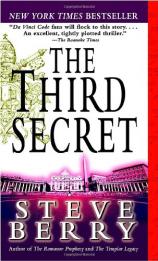The Third Secret
Review
The Third Secret
Before one starts reading THE THIRD SECRET, it would be a good idea to take a nice deep breath and accept the fact that this is one book that will raise some controversy. The Catholic Church is considered fair game right now, and some of the wounds it has suffered in recent years have been self-inflicted. Accordingly, this tale of entrenched interests versus the humble servants trying to do the right thing seeks, ultimately, to turn faith and logic --- they're not necessarily mutually exclusive --- on their respective ears. So the conclusion of Steve Berry's latest novel inevitably will upset some folks. Fair enough. The thing to remember is that THE THIRD SECRET is a story, a work of fiction, and does not pretend to be anything more, or less. It also is excitingly and brilliantly told, and a terrific read.
The backstory of THE THIRD SECRET is in some ways almost as interesting as the novel itself. Berry wrote this religion-tinged manuscript in 1998, and garnered a ton of rejection slips before ultimately selling it as part of a well-deserved three-book deal in 2002. One finds it difficult to understand why this novel wasn't snapped up years ago. Dealing as it does with one of the more interesting controversies of the twentieth century, THE THIRD SECRET is an intricate, well-written tale that undoubtedly will generate discussion and controversy.
The title refers to the revelation bestowed upon three shepherd children in Fatima, Portugal in 1917 during a series of appearances by the Virgin Mary. Three messages were purported to be given to the children: the first two were revealed almost immediately, while the revelation of the third was to be delayed. A number of popes read the secret but refused to reveal it. One apocryphal story concerned John XXIII reading it and crying, in seclusion, for three weeks. John Paul II ultimately revealed the secret in 2000, the official explanation being that it prophesied the assassination attempt upon his own life that had taken place some years previously. The thrust of the novel is that the third secret of Fatima is, in fact, something else entirely; that the true secret is known only to each pope (and, as it turns out, to a number of others); and that the successor popes have declined to reveal the third secret because it would shake the beliefs that the modern church holds dear and true.
As THE THIRD SECRET begins, Pope Clement XV is deeply troubled by a matter of conscience concerning the secret that brings him repeatedly into the Vatican's private archives where the Fatima papers are kept. Clement sends his trusted secretary and friend, Father Colin Michener, into Romania to seek out one of the only individuals who may know the true meaning behind the third secret. There are, however, malevolent forces within The Vatican who know what the third secret really is and what its revelation will mean not only to the Church but also to its inherent power --- and who will stop at nothing to keep the secret from being uncovered.
Michener, meanwhile, is distracted by his own passions, which his vow of celibacy forbids him from satisfying. In addition to his mission, Michener must resolve the issue of why his vocation and his God seem to leave him unfulfilled. Berry balances these issues nicely, keeping his story running along a number of parallel tracks while never dwelling for too long on one scenario while switching to another. The result is a complex, exciting work that is almost impossible to put down.
The ultimate revelation presented in THE THIRD SECRET may well spoil the work for some; one wonders if Berry might have been better served to leave the foundation of the secret unanswered for the reader to sort out. But again, THE THIRD SECRET is a work of fiction, well-written and well-told. It ultimately is well worth reading, whether or not the concluding revelations as presented are to one's liking.
Reviewed by Joe Hartlaub on January 23, 2011





